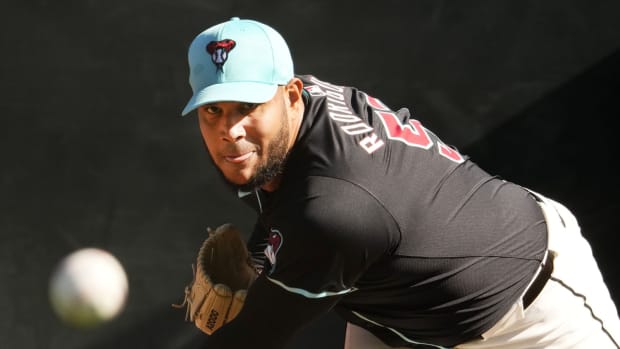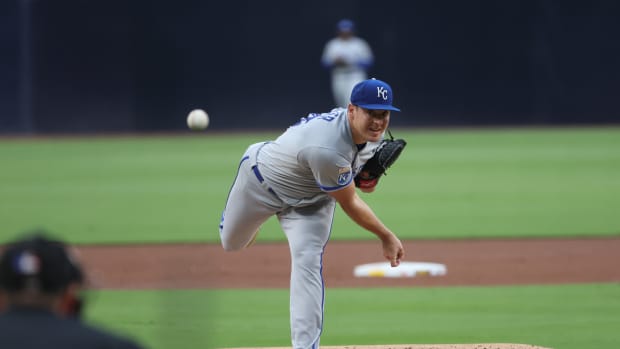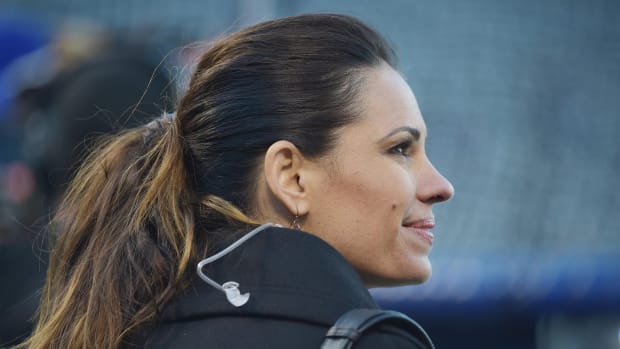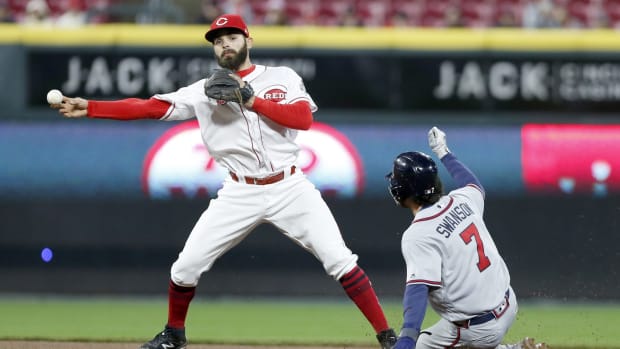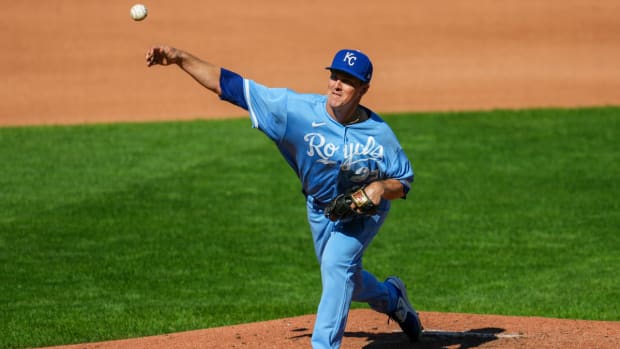Looking Back at Royals Trade Ideas From the Fall: AL West
It's time for part two of this reexamination of the trade ideas I proposed in the fall. Last time, we examined the previous trade ideas for the American League East. Now, let's head out to the AL West and look at whether these trade ideas still hold up in theory.
Los Angeles Angels
Los Angeles receives: C Cam Gallagher, RHP Joel Payamps, SS Lucius Fox
Kansas City receives: C Max Stassi
Initial logic: The Kansas City Royals needed to get ahead of Salvador Perez's physical decline by trading for an everyday catcher that could carry the bulk of the workload. In exchange, the Royals give the Angeles for a former Futures Game prospect in Fox (who was coming off his best season as a minor-leaguer), a veteran relief pitcher and a stopgap catcher in Cam Gallagher, who could hold down the fort until the following offseason when Buster Posey became a free agent.
Hindsight: So... yeah.
As it turns out, Posey didn't want to play baseball anymore and left with his health and legacy still intact. The Angels are a big move organization that never seems to pull off the right one but had Posey not retired this year and wanted to chase one last big payday in free agency, LA definitely would've been contenders for his services.
The catching free agent class this offseason will still be stacked, with Willson Contreras, Christian Vazquez, Omar Narvaez and Gary Sanchez being the top options. Stassi has taken a step back to his usual level, and the Angels are likely to seek an upgrade this offseason. My logic was sound, but the best option decided to hang up the spikes.
Payamps is still a solid enough reliever and could be traded at the deadline this year, and Gallagher is still a capable backup catcher. With the Royals' minor league depth at the position and the emergence of MJ Melendez, this season is probably the last for Gallagher in KC. On the other hand, Fox is a AAAA-level player who was waived and hasn't been able to hold down a spot with the lowly Washington Nationals.
Summary: The Angels still need a more stable option behind the plate than Stassi, who has never caught 100-games in his career, and they'll have the ability to make that move in the offseason. None of these players involved in this proposed trade should be on their respective rosters next year, so it would've been an utterly inconsequential trade.
Oakland Athletics
Oakland receives: SS Adalberto Mondesi, RHP Domingo Tapia, RHP Alec Marsh
Kansas City receives: SP Chris Bassitt, UTIL Tony Kemp
Initial logic: The Royals ship off one of their top 30 prospects in Marsh, along with a solid reliever in Tapia, and rid themselves of the everlasting "potential" of Mondesi in exchange for an All-Star pitcher in Bassitt and veteran utility man who was coming off his best season as a pro.
Hindsight: The A's did end up trading Bassitt to the Mets in exchange for a pair of minor league pitchers, so the initial logic of the trade still holds up. Bassitt hasn't been an ace-caliber pitcher this season with the Mets, but he's been a solid addition to what should be a playoff contending squad.
Tapia and Marsh would've been fair compensation for Bassitt, and the exchange of Mondesi for Kemp would've given Oakland a player with a higher ceiling than Kemp but not one capable of being rebuilt around. The trade makes sense value-wise but after this season, not many teams will want anything to do with Mondesi.
Summary: To think that all it would've taken for the Royals to upgrade their pitching staff significantly was to depart with a mid-level prospect and a veteran reliever speaks to how many possibilities the club passes on.
Texas Rangers
Texas receives: SS Adalberto Mondesi, RHP Scott Blewett, RHP Ronald Bolanos
Kansas City receives: 1B Nate Lowe
Initial logic: The Rangers can clear the way for Jace Jung to take over at first base by trading Lowe to the Royals in exchange for Mondesi, who could take over at third for Texas to go along with a pair of pitchers that improve depth.
Hindsight: The Rangers were terrible last season and responded by spending big in the offseason to get Corey Seager and Marcus Semien, so the middle of the infield was something that the Rangers wanted to improve. Mondesi wouldn't have been in the middle of the Texas infield but rather in the corner, because that area is a massive hole that has yet to be filled by an Adrian Beltre replacement. Jung is the Rangers' star prospect and profiles better as an athletic first baseman than a long-term third baseman.
That being said, Lowe looks like he's going to be a future part of the Rangers' plan — they're not going to be keen on moving him anytime soon. While not necessarily an elite piece, it does look like he'll be able to provide some cheap offensive consistency while they try to rebuild elsewhere.
When I made the 29 Trades in 29 Days series, I was never short on ideas of how to move Mondesi. The main issue always boiled down to finding a team that would take him off the Royals' hands. Unfortunately, this trade doesn't hold up well with Mondesi having his usual injury trouble and Blewett flaming out of the organization.
Summary: I stand by what I said about Jung being a better prospect at first base than at the third base, so Lowe's future home will probably be at designated hitter. The Rangers still need an answer at third if they want to become a legit contender. However, as Royals fans know, Mondesi is not a legit answer to anything.
Houston Astros
Houston receives: RHP Scott Barlow, RHP Josh Staumont, SP Jackson Kowar, SP Mike Minor
Kansas City receives: SP Cristian Javier, SP Jose Urquidy, RHP Ryan Pressly, RHP Forrest Whitley, OF Jose Siri, OF Jake Meyers.
Initial logic: The Royals trade two potential All-Star Relievers in Barlow and Staumont, along with what was once a top 10 organizational prospect in Kowar and a veteran starter in Mike Minor for two back-end starters, an older reliever and three prospects who are blocked by better players in the Astros organization.
Hindsight: When I proposed this trade, I wanted to make a blockbuster deal where Houston and Kansas City both got potential All-Stars and everybody walked away happy. As it turns out, this was way too much for Houston to give up for Barlow and company. Urquidy and Javier aren't stars, but they are still solid enough pitchers that fit nicely into a stacked Houston pitching staff and while Pressly might be hurt now, he is still an excellent reliever.
A Barlow-Staumont package might be enough to tempt Houston to give up Whitley and either Meyers or Siri, but not both. But with how bad Whitley has been in Triple-A this year and how underwhelming Siri and Meyers have been in Houston, an updated trade this year is a blockbuster.
Summary: Houston is loaded with talent and will be a force in the AL for a long-time, and it's because of their excellent player development. Meanwhile, the Royals are where they are because they're lacking in player development.
Seattle Mariners
Seattle receives: UTL Whit Merrifield
Kansas City receives: LHP Marco Gonzales, RHP Paul Sewald, 3B Milkar Perez
Initial logic: Improve an inconsistent Seattle club with Merrifield in exchange for a veteran starter, reliever and a switch-hitting infield prospect in Perez.
Hindsight: As it turns out, Julio Rodriguez is that good. The signings of Jesse Winker and Eugenio Suarez and the continued development of Ty France and Cal Raleigh are enough to cover up what is still a hole at second base for Seattle. Gonzales and Sewald are also performing up to standards this year and are critical pieces of what appears to be a Mariners team that might be able to snap the league's longest playoff drought.
On the other hand, Merrifield has had a tumultuous season and will very likely be on another team next year. The time to pull the trigger on a Merrifield trade was before the rest of the league realized he was cooked.
Summary: This trade was optimistic, to say the least, and would've required the Mariners to place more trust in Merrifield than the likes of Sewald and Gonzales. In the end, the Mariners put their trust in their organization and it's paid off huge dividends.

